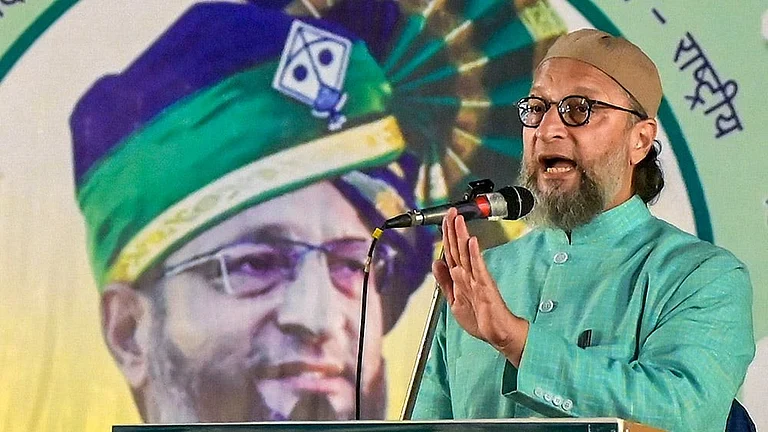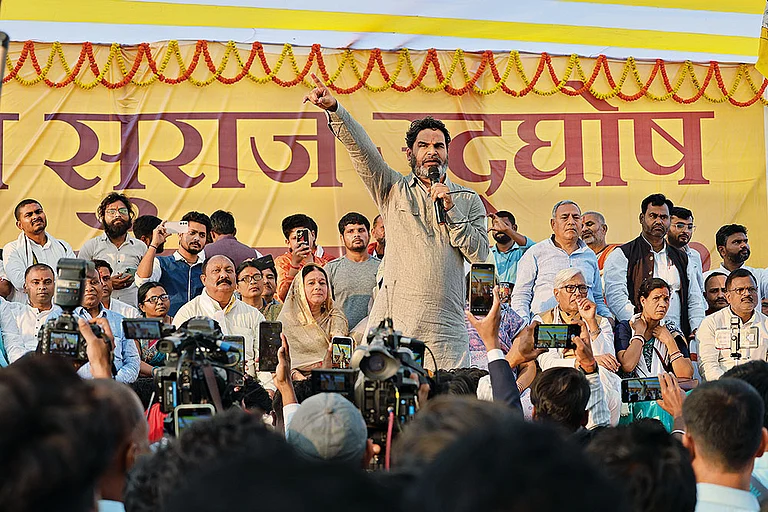
Summary of this article
In the 2020 Bihar Assembly elections, the AIMIM had fielded 20 candidates—16 from Seemanchal. The party won five seats—all in this region
Politically, Seemanchal is crucial for the AIMIM because of its 47 per cent Muslim population, far higher than the state average of 18 per cent
In the run-up to the Bihar elections, the AIMIM is entirely focused on Seemanchal, where Asaduddin Owaisi has been holding roadshows and rallies for the past several days
All India Majlis-e-Ittehad-ul-Muslimeen (AIMIM) chief Asaduddin Owaisi recently reiterated at a public meeting in Seemanchal, Bihar, that his party has demanded only six seats from the Mahagathbandhan. Akhtarul Iman, AIMIM’s Bihar chief, has written twice to the Rashtriya Janata Dal (RJD) requesting inclusion in the alliance.
Owaisi said in the meeting: “Give us just six seats. We had won five of them earlier. Even if you (INDIA bloc) come to power, don’t make us ministers—just set up a Seemanchal Development Council. We too don’t want the BJP to come to power. We’ve fulfilled our duty; now it’s up to the people of Seemanchal to decide who wants to help the BJP succeed and who wants to stop it. We’ve done our part. Whatever decision the RJD takes, we’re ready. But no one should call us the B-team again.”
Two weeks earlier, Iman had marched with AIMIM workers to Lalu Prasad Yadav’s residence in Patna, chanting: “Lalu-Tejashwi apne kano ko khol, tere darwaje par baj raha hai dhol, gathbandhan ke liye darwaza khol, warna khul jayega tere M-Y (Muslim-Yadav) samikaran ka pol.” (Lalu-Tejashwi, open your ears, drums are beating at your doorstep. Open the doors for alliance, or the M-Y equation will be exposed.”)
Iman was referring to Mukesh Sahni’s Vikassheel Insaan Party, which had deserted the Mahagathbandhan just before the 2020 Assembly election and joined the National Democratic Alliance (NDA). However, the party is now back in the Mahagathbandhan fold and is a part of the INDIA bloc.
Iman argued that the RJD had welcomed into the alliance a party (the Vikassheel Insaan Party) that had recently been with the BJP, but it is hesitating to include the AIMIM—a party that has consistently fought against the BJP. According to him, the RJD seeks Muslim votes under the M-Y equation, but does not want to give Muslims real representation.
The moot question being raised in the political arena is—why is the AIMIM, despite having contested 20 seats against both the Mahagathbandhan and the NDA in 2020—now pleading repeatedly to be included in the Mahagathbandhan?
AIMIM’s national spokesperson Adil Hasan explains: “Do we want to hand Bihar over to the BJP? If they (Mahagathbandhan) don’t give us seats, fine, but we’ll continue to try until the very end to be part of the alliance. Our goal is to stop the BJP, not to satisfy egos. If the BJP comes to power, Bihar will be worse off than Uttar Pradesh.”
Hasan adds that if no alliance is formed in the end, the AIMIM will contest in 50–60 seats with other parties committed to defeating the BJP; not just in Seemanchal, but also in Mithilanchal, Magadh and Shahabad.
In the 2020 Bihar Assembly elections, the AIMIM had fielded 20 candidates—16 from Seemanchal. The party won five seats—all in Seemanchal. The region has 24 constituencies across Purnia, Katihar, Kishanganj and Araria districts. Politically, Seemanchal is crucial because of its 47 per cent Muslim population, far higher than the state average of 18 per cent. This explains why the party is insisting on a share in the Mahagathbandhan. Otherwise, contesting 50–60 seats could cause a major split in the Muslim votes.
In this context, the AIMIM has stated that if it is not included in the Grand Alliance, the party may contest 50–60 seats in Bihar. But how much would this fragment the Muslim vote?
Journalists who closely track Seemanchal politics remain sceptical. Tanzil Asif, the founder of Main Media, argues that the party does not have a statewide presence in Bihar. He notes that the conditions that enabled AIMIM’s five-seat victory in 2020 no longer exist in 2024.
Asif further explains: “If Owaisi saab claims to represent the community’s leadership but fails to provide it, people lose trust. The AIMIM has no other strong leader apart from Akhtarul Iman. At most, they could win one or two seats in Seemanchal this time. Last time, voters were fed up with the RJD and the Congress repeatedly fielding the same candidates who had already served seven or eight terms. That’s why the AIMIM emerged as an option in some seats. But this time, the RJD doesn’t face any leadership crisis in Seemanchal.”
It is noteworthy that out of AIMIM’s five MLAs, four have left the party and joined the RJD. The AIMIM is entirely focused on the Seemanchal region, where Owaisi has been holding roadshows and rallies for the past several days. Out of the 24 seats in Seemanchal, 11 are currently held by Muslim legislators. According to reports, among the six seats that the AIMIM is demanding from the Grand Alliance, five are the very seats it had won in the last election.
In 2020, the RJD-led Mahagathbandhan had secured 110 seats, while the NDA won 125 in the 243-member Assembly. Both alliances polled around 37 per cent of the votes. On the 20 seats that the AIMIM contested, the results were split: AIMIM won five, NDA six, and Mahagathbandhan nine. AIMIM had then contested as part of the Grand Democratic Secular Front (GDSF), which included the Bahujan Samaj Party (BSP). Together, AIMIM polled 14.28 per cent of votes across those 20 seats, with most of its candidates being Muslim.
Since the Mahagathbandhan narrowly lost in several constituencies, many in the Congress labelled the AIMIM as a vote-cutter and a “B-team of the BJP.”
So, will Owaisi’s party have an impact in Bihar this time?
Data scientist and election analyst Ashish Ranjan believes that the RJD’s rejection of AIMIM’s proposal is strategic. Since AIMIM is seen as a hardcore Muslim party, allying with it would only reinforce RJD’s own “Muslim party” image.
“Whether Owaisi contests alone or with other non-INDIA bloc parties, his votes will mostly cut into the Mahagathbandhan’s base. But if the AIMIM contests alone, the damage won’t be very large—because Muslims in Bihar don’t have a real alternative outside the RJD-led bloc, just like the Brahmins who don’t have an option beyond the BJP,” he says.
However, Ranjan warns that if the AIMIM were to ally with Prashant Kishor’s Jan Suraaj party, the INDIA bloc could suffer serious damage. Kishor has consistently raised the issue of Muslim representation and has even claimed that his party could field 40 Muslim candidates.
Reports suggest that the AIMIM has already held two rounds of talks with Kishor, though nothing concrete emerged. The AIMIM doesn’t deny the meetings, but party leaders say Kishor wanted Iman to merge into his party, while Iman insisted on fighting the elections together. Meanwhile, Jan Suraaj leaders deny any such discussions.
Observers note that AIMIM’s entire political relevance in Seemanchal hinges on Iman. Without him, the party would have no significant standing in the region.
Owaisi’s AIMIM, despite past clashes, is desperate to enter the Mahagathbandhan to secure Muslim representation in Seemanchal, but the RJD fears its inclusion could backfire—leaving AIMIM torn between alliance hopes and the risk of political irrelevance.




























